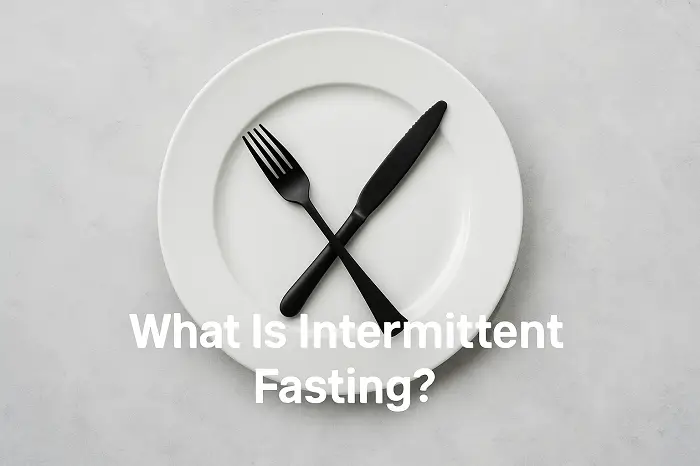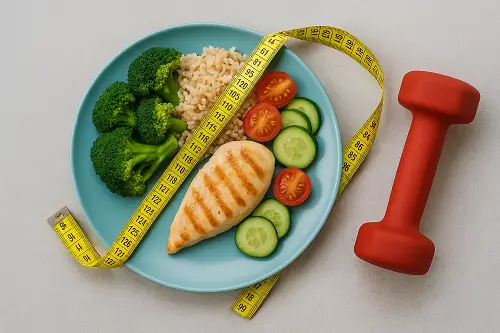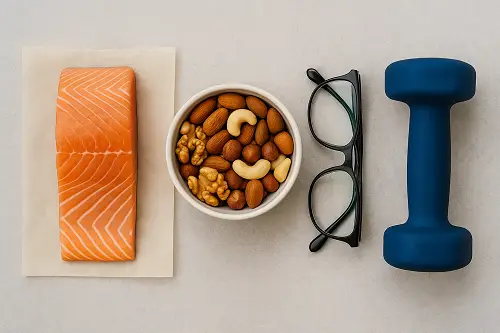Intermittent Fasting: Is It Right for Your Weight Loss Goals?
Published On : 6th May 2025

In the world of health and fitness, intermittent fasting (IF) has quickly become a buzzword. But beyond the hype, many people are seeing real results using this eating pattern to lose weight and feel better. So, the question is: Is intermittent fasting right for your weight loss goals? Let’s break it down.
What Is Intermittent Fasting?
Intermittent fasting isn't a diet—it’s an eating pattern that cycles between periods of fasting and eating. Rather than focusing on what you eat, it emphasizes when you eat.

Some popular IF methods include:
- 16/8 Method: Fast for 16 hours, eat during an 8-hour window (e.g., 12pm–8pm)
- 5:2 Diet: Eat normally for 5 days, then limit calories to 500–600 for 2 non-consecutive days
- Eat-Stop-Eat: 24-hour fasts once or twice a week
How It Can Support Weight Loss
While intermittent fasting isn’t magic, it can create the right conditions for fat loss—especially when combined with healthy eating and movement. Here's how it may help you reach your goals more effectively:

- Reduces Calorie Intake: By shortening your eating window, you’re naturally more likely to consume fewer calories—without obsessively tracking them.
- Boosts Fat-Burning Hormones: Fasting can increase norepinephrine and human growth hormone (HGH), both of which play a role in fat burning.
- Improves Insulin Sensitivity: Lower insulin levels during fasting periods may make it easier for your body to access stored fat for energy.
- Supports a Simpler Eating Routine: With fewer meals to plan, intermittent fasting can streamline your day and reduce the temptation to snack mindlessly.
Potential Benefits Beyond Weight Loss
Weight loss might be your main goal, but intermittent fasting could offer a lot more than just shedding pounds. Many people report feeling better overall, and emerging research suggests IF might have a range of health perks. Let’s take a closer look:

- 🧠 Better Blood Sugar Control: Fasting gives your body a break from constant glucose spikes, which may help stabilize blood sugar levels over time. This could reduce the risk of insulin resistance and type 2 diabetes, especially when paired with a balanced diet.
- 🧘 Improved Focus and Mental Clarity: Many IF practitioners report feeling more mentally sharp during fasted periods. That’s partly due to more stable energy levels and potentially higher production of brain-supporting hormones like BDNF (brain-derived neurotrophic factor).
- 🔥 Reduced Inflammation: Chronic inflammation is linked to numerous health issues, including heart disease and arthritis. Some studies suggest intermittent fasting can help lower markers of inflammation, giving your body a better environment for healing and repair.
- ❤️ May Support Heart and Brain Health: Intermittent fasting may improve risk factors like cholesterol levels, blood pressure, and oxidative stress. There's also early research exploring how IF might protect brain health and reduce the risk of neurodegenerative diseases like Alzheimer’s—but more studies are needed.
Who Might Thrive with IF?
Intermittent fasting may be a great option if you:

- Prefer fewer, larger meals over frequent snacking
- Struggle with late-night eating
- Want a more structured eating schedule without calorie counting
When It Might Not Be Ideal
IF isn’t for everyone. You may want to reconsider or consult a health professional if you:

- Have a history of eating disorders
- Are pregnant, breastfeeding, or trying to conceive
- Struggle with blood sugar regulation or certain medical conditions
- Feel lightheaded, irritable, or overly hungry while fasting
Tips for Getting Started
Thinking about trying intermittent fasting for the first time? It can feel a bit intimidating at first, but easing into it with the right strategy makes all the difference. Here are some practical tips to help you get started safely and successfully:

- 🕰️ Start Slowly: Instead of jumping straight into a long fasting window like 16 hours, begin with a 12:12 schedule (12 hours fasting, 12 hours eating). For example, stop eating at 7 PM and have your first meal at 7 AM. Once your body adjusts, you can gradually increase the fasting window to 14 or 16 hours if desired.
- 💧 Stay Hydrated: Water is your best friend during a fast. Dehydration can mimic hunger, so make sure you’re drinking enough throughout the day. Herbal teas and black coffee (without cream or sugar) are also great options that won’t break your fast and can help curb appetite.
- 🍳 Break Your Fast with Whole Foods: When your eating window opens, resist the urge to reach for processed snacks. Instead, fuel your body with nutrient-dense foods like lean protein (chicken, eggs, tofu), healthy fats (avocado, olive oil), and fiber-rich carbs (vegetables, whole grains). This helps stabilize blood sugar and prevents post-fast energy crashes.
- 🧠 Be Patient with Your Body: It’s normal to feel a bit off during the first few days—your body is adapting to a new rhythm. You might feel hungrier or more tired than usual at first, but these effects usually fade within a week or two. Stay consistent, listen to your body, and don’t be afraid to adjust the fasting window if needed.
Sample Schedule
- 🕒 Sample Intermittent Fasting Schedule (16:8 Method):
- Fasting Window: 8:00 PM – 12:00 PM (next day)
- Eating Window: 12:00 PM – 8:00 PM
- 🍽️ Sample Meal Plan:
- 12:00 PM – First Meal (Break-Fast):
1. Grilled chicken salad with mixed greens, olive oil & lemon dressing
2. Quinoa or brown rice (½ cup)
3. A handful of almonds or walnuts
4. Green tea or water with lemon
- 3:30 PM – Snack (Optional):
1. Greek yogurt or protein smoothie with berries
2. 1 boiled egg or a protein bar (low sugar)
3. Herbal tea or black coffee
- 7:30 PM – Final Meal (Dinner):
1. Baked salmon or tofu
2. Steamed broccoli or asparagus
3. Sweet potato or cauliflower mash
4. Chamomile tea or plain water
Intermittent fasting can be a powerful tool in your weight loss toolkit—but like any strategy, it’s not a one-size-fits-all solution. The best approach is one that fits your lifestyle, supports your energy levels, and helps you stay consistent over time.
Listen to your body, and do what works best for you. That’s the real key to sustainable weight loss.






